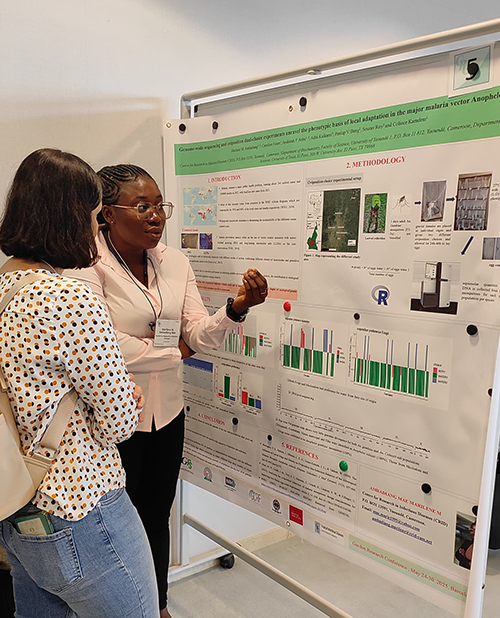Three researchers from CRID recently participated in the prestigious Malaria Gordon Research Seminar (GRS) and Gordon Research Conference (GRC), held in Barcelona, Spain. This renowned international scientific gathering brought together leading experts dedicated to advancing the frontiers of malaria research.

Gadji Mahamat: Unveiling Genomic Insights into Insecticide Resistance
Gadji Mahamat, a PhD candidate and Research Assistant at CRID, made a significant impact as a speaker at both the GRS and GRC events. On May 24, 2025, at the GRS, Gadji delivered a compelling presentation on the genomic evolution and insecticide resistance of Anopheles funestus—one of the world’s most dangerous malaria vectors—with a special focus on Cameroon. He shared groundbreaking genomic evidence revealing the emergence and rapid spread of key pyrethroid resistance loci within just seven years in Anopheles funestus populations from Mibelong, Cameroon. Gadji highlighted how temporal selection pressures have driven the fixation of missense mutations and structural variants, particularly in major cytochrome P450 genes located within these loci. His findings underscore the urgent need for functional validation of these variants and the development of cost-effective genomic surveillance strategies across Cameroon.
On May 27, 2025, Gadji presented at the GRC, expanding on his earlier work. He discussed the genomic evolution and insecticide resistance of Anopheles funestus in Cameroon, providing compelling evidence of the emergence and rapid dissemination of major resistance loci, including rp1 and CYP9. He emphasized how the interplay of multiple genetic factors enables mosquitoes to withstand even extreme doses of insecticides. Gadji’s research highlights the critical importance for the National Malaria Control Programme to consider the complexities of resistance when designing and implementing vector control interventions across the country.

Marie Mae Ambadiang: Exploring Local Adaptation in Malaria Vectors
Marie Mae Ambadiang, a PhD student at CRID, also made valuable contributions at both the GRS and GRC. She delivered an oral presentation and presented a poster on her PhD research, “Genome-wide sequencing and oviposition dual-choice experiments unravel the phenotypic basis of local adaptation in the major malaria vector, Anopheles gambiae.” Her findings revealed that Anopheles gambiae exhibit a strong preference for laying eggs in water collected from their site of origin, indicating a high degree of source specialization. In contrast, Anopheles coluzzii showed little discrimination, laying eggs regardless of the water source. This pronounced oviposition preference in Anopheles gambiae subpopulations suggests a remarkable level of local adaptation, even among populations with low genome-wide divergence within the same ecological biome.
Prof. Charles Wondji: Addressing the Genetic Basis of Insecticide Resistance
On May 28, 2025, Prof. Charles Wondji delivered an insightful talk on the “Genetic Basis of Resistance Escalation to Insecticides in Malaria Vectors in Africa.” He highlighted the challenges, recent progress, and innovative diagnostic tools being developed to mitigate the impact of resistance on the efficacy of vector control interventions, such as insecticide-treated bed nets.






